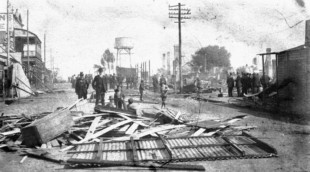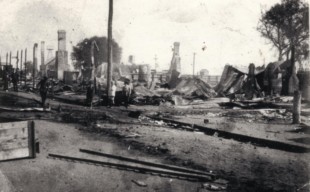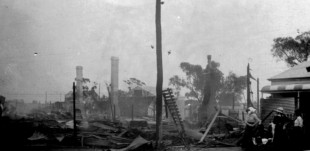Although the fire brigade had the advantage of a fair water supply from
the start, the firemen, for some inexplicable reason could not get the water
through the hydrant until after the flames had shot out in every direction and
this unfortunate hitch was followed later by the snapping of the first hydrant
just above the logs. A second hydrant was put in position but it shared a similar
rate. Some of the firemen essayed to straighten out the hose when fully charged
and a number of by-standers joined in the tug-o-war. As hydrants are not
intended to take the place of lever-jacks nor is fire hose built for hawser work,
the extra strain imposed upon them proved too great and the result was that
the appliances were rendered useless for fully an hour and not until a local plumber
had patched up one of the hydrants were the firemen able to direct a jet
of water onto the stricken buildings Meanwhile the fire had made considerable headway
and town structures had to be cut out and demolished in order to stem the
devastating strides. Tongues of flame reached out over the Royal Hotel, a large
two-storey structure and flying embers found lodgement fully five chains back
from the main street. It is estimated that property costing fully £15,000 was destroyed in the two hours during which the fire raged and in addition a large quantity of furniture stock and fittings removed from premises threatened with destruction was badly damaged. The fire also destroyed the telephone and telegraph wires and one of the poles in the principal street and on Sunday and Monday messages had to be transmitted through the railway station via Ultima and Tyrrell Downs. The premises blotted out by the fire included Mr P. Daly's (solicitors) offices, Messrs Morrow and Co's (auctioneers) offices, Mr W. L. Ingram's bakery and residence, Mr H. J. Cox's (wheat buyer and commission agent) offices and machinery salesroom, Mr R. V. Couche's (cash grocer) shop and fittings, Mr 0. Hayes (saddler) shop and fittings, Mr Haye's dwelling and shop, Mr W. S. Dennis's (hairdresser) shop and fittings, Mr B. Stubbs' (drapery and newsagency) shop and stock, Mr B. Kirchner's (baker) shop and dwellings, F. A. Howard's office, F. A. Howard Pty. Ltd. (general merchants) shop and fittings, Mrs Donnelly's (fruiterer) shop, Mr W. Arundell's boot shop and Mrs Pearce's fruit shop - fourteen premises in all. The Bank of Victoria on the extreme corner was also badly damaged and on the opposite side of the street the following premises were badly scorched and otherwise damaged by fire and water: Commercial Bank, dwelling and furniture, Mrs Garden's premises, Mr T. Pye's butchery, Mr Sandiford's office and Messrs Ed. Trenchard & Co's offices. With so many willing helpers operating in various and numerous ways and at different points and simultaneously we find it impossible to mention the names of those who assisted. Suffice it to say that everybody present did what he or she could to cheat the ravenous elements of part of their spoliative design." Family recollections of the disaster reveal that the local constable was in the shop at the time of the falling of the kerosene lamp and that in his attempts to kick the lamp out the door did little but burst the lamp spreading the kerosene in all directions thereby extending the fire to a large area. The former stationery business of Edward Watts taken over by Clarence Mudge in 1908 had been converted into a coffee palace and by 1911 had become the Crown Cafe run by Mrs Mary Edith Lugg. Following the disastrous fire Mrs Lugg decided to cease her operations and a lease was taken out by Stubby, not to be deterred by the total loss of his business, at the rate of £1/5/- per week. A notable condition of the lease was that "the landlord agrees to put in four Electric Lights as required by the Tenant, as soon as possible, free of charge to the Tenant." In an effort to make up for the devastating loss of the fire virtually every saleable item was stocked by Stubby at this time. His ledgers of the 1914-15 period highlight such items as Bibles 4/6d, Prayer books 7/6d, cups and saucers 9d, trophy 5/6d, music 2d, 4 lbs apples 2/-, cabbage 6d, German sausage 5½d and of course periodicals such as Herald 1d, Weekly Times 3d, Leader 3d, Sea Lake Times 3d and Everylady's 6d. Papers and magazines arrived daily by train at approximately 9 pm. Expenses showed electricity for two months to August cost 15/3d, a telegram 1/- and horse feed for the family's mode of travel was £1/14/-. |



The aftermath of the 1914 fire. |